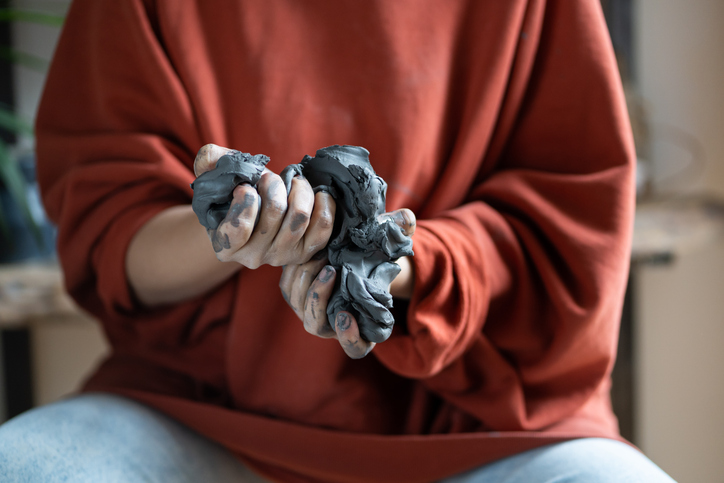
What Is the Difference Between Art as Therapy and Art Therapy?
Art as therapy involves using creative expression as a way to manage stress and improve mental well-being without the guidance of a professional. Activities like painting, drawing, or sculpture can serve as helpful coping mechanisms for life’s challenges. While this form of therapy provides emotional release and can be beneficial, it lacks the structured approach and ethical practice found in clinical settings.
Art therapy, on the other hand, is conducted by licensed art therapists and is a recognized mental health profession. This practice of art therapy involves tailored, evidence-based treatments designed to address specific mental health conditions such as post-traumatic stress disorder, anxiety disorders, and Bipolar disorder. It incorporates therapeutic sessions within a supportive environment aimed at fostering self-awareness and improving interpersonal skills.
What Do Our Art Therapy Programs Involve?
Initial Assessment
The process begins with an initial assessment conducted by a licensed art therapist. This evaluation helps to identify the individual’s history, traumatic experiences, and current mental health conditions. It also sets the stage for developing a personalized treatment plan. The assessment is done in a confidential environment to ensure privacy.
Creating a Treatment Plan
After the initial assessment, a tailored treatment plan is formulated. This plan includes specific art therapy techniques best suited for the individual. It considers the person’s emotional expression, interpersonal skills, and coping mechanisms. The treatment plan is also integrated with other forms of expressive therapies if needed, such as cognitive behavioral therapy or dialectical behavioral therapy.
Therapeutic Sessions
Therapeutic sessions are conducted in a supportive space, encouraging creative expression. These sessions involve various art forms, from painting and drawing to sculpture and collage. The goal is to foster a deep connection with emotions and improve communication skills. Each session is designed to enhance the therapeutic relationship between the therapist and the client.
Review and Adjustments
Progress is reviewed periodically to ensure the treatment plan remains effective. Adjustments are made based on the individual’s progress and changing needs. Feedback from the client is incorporated into these adjustments, making the therapy more personalized. This ongoing review helps in addressing new issues that may arise during therapy.
What Are the Benefits of Our Art Therapy Programs in New Jersey?
Emotional Expression
Art therapy facilitates emotional expression, helping individuals articulate feelings they might struggle to verbalize. This is particularly beneficial for those dealing with childhood traumas and the aftermath of trauma. Expressing these emotions through creative arts therapy can lead to significant emotional relief. Effective emotional expression is crucial for mental health care and recovery. It creates an emotional space that encourages healing.
Improvement in Communication Skills
Engaging in art therapy can significantly improve communication skills. This is essential for individuals facing relationship issues and social skills deficits. The practice helps develop better interpersonal connections, which in turn contribute to better relationships in daily life.
Stress and Anxiety Reduction
Art therapy techniques are highly effective in reducing stress and anxiety. Symptoms of anxiety can be overwhelming, and traditional forms of therapy may not always be sufficient. Creative expression provides an alternative way to manage these symptoms. It acts as a coping mechanism, helping individuals deal with anxiety disorders and stress.
Addressing Grief and Loss
Grief after loss can be a challenging emotion to navigate. Art therapy treatment in New Jersey offers a compassionate space to process these feelings. It aids in the journey through grief by allowing individuals to express their emotions creatively. This form of therapy is particularly beneficial for individuals who have experienced significant loss.
Boosting Self-Esteem
Creating art in a therapeutic setting can significantly boost self-esteem. Completing an art project can provide a sense of achievement and self-worth. This is especially beneficial for those recovering from addiction and other mental health conditions. Improved self-esteem contributes to overall mental health and well-being.
One significant benefit of art therapy is the development of coping skills. These skills are essential in dealing with daily stressors and difficult life transitions. Art therapy provides tools that individuals can use long after the sessions are over. Effective coping skills are crucial for sustained recovery.
Art Therapy Near Me: Choose BlueCrest Recovery Center in New Jersey
Art therapy for recovery offers a creative, supportive, and effective path to mental health. At BlueCrest Recovery Center, our specialized programs are designed to help you heal.
Take the first step towards recovery by contacting us today. Our compassionate care team is ready to assist you. We work with most major insurance companies to ensure you get the care you need without the burden of financial stress.
Call us now to speak to an addiction specialist. There’s no commitment or obligation, and all calls are kept 100% confidential. Reach us at BlueCrest Recovery Center today.





